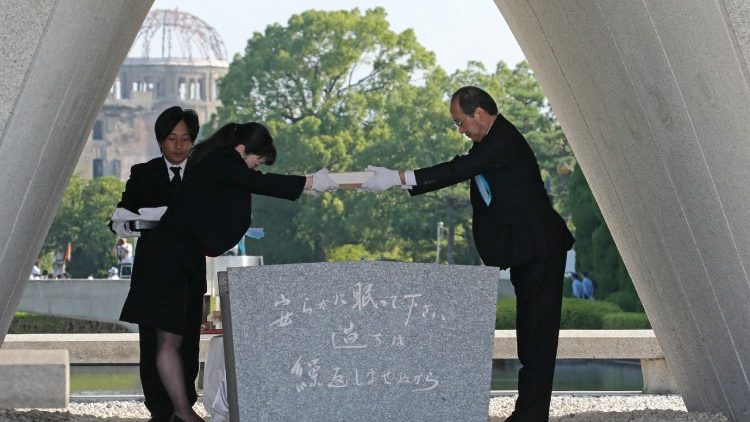73 years on, Hiroshima remembers
 The Catholic Bishops’ Conference of Japan opened the “Ten Days for Peace, 2018” on the 6th of August – 73 years after the USA dropped the first ever atomic bomb over the city of Hiroshima.
The Catholic Bishops’ Conference of Japan opened the “Ten Days for Peace, 2018” on the 6th of August – 73 years after the USA dropped the first ever atomic bomb over the city of Hiroshima.
This ten-day period opened with an Ecumenical prayer and marks a period dedicated to a “Concern with the Problem of Peace”. Like every year, the City of Hiroshima will mark the event with the tolling of the Peace Bell. At the monument commemorating the victims, the mayor will add the names of survivors who have passed away since 6 August of last year.
The bombs dropped on Hiroshima (6 August) and Nagasaki (9 August) killed about 140,000 people. Known as hibakusha (explosion-affected people), the surviving victims of the atomic bombings of Hiroshima and Nagasaki carry the signs and live with the illnesses left by their experience. At present, they number around 190,000 and their average age is 79.
Remembering why peace is worth fighting for
Joseph Mitsuaki Takami, Archbishop of Nagasaki and President of the Catholic Bishops’ Conference of Japan, reflected on the Ten Days for Peace.
He said this year’s commemoration marks the 100th anniversary of the end of WWII, 70 years since the murder of the father of Indian Independence, Mahatma Gandhi and the 50th anniversary of the assassination of Reverend Martin Luther King, leader of the African-American Civil Rights movement. He called these “tragedies” which remind us about and lead us to reflect upon war and peace.
100 years of a desire for Peace
Archbishop Takami brings up several events and enforcements that have marked history over the last 100 years, in terms of working to obtain peace and protect human rights. These include:
· The establishment of the League of Nations
· The enactment of the 1928 Kellogg-Briand Pact that pledged nations to “condemn recourse to war for the solution of international controversies and renounce it as an instrument of national policy in their relations with one another”
· WWII and the subsequent establishment of the United Nations
· The Cold War and the collapse of the Communist bloc.
· Around 100 colonies of Britain, France, the Soviet Union, the United States and other achieving their independence
From this list he concludes that “Overall, it can be said that peace and the protection of human rights have been a universal desire.”
Nuclear weapons, necessary for Deterrence?
Despite this desire for peace, Archbishop Takami states that regional conflicts, terrorism, threats of nuclear weapons, refugee problems, discrimination in various forms and economic disparity are threatening people’s peace all around the world.
Only 11 countries, amongst which the Vatican, have approved the UN’s Treaty on the Prohibition of Nuclear Weapons. He uses this statistic to express his view on the strong idea that nuclear weapons are necessary for deterrence.
“Deterrence is an attempt to maintain peace by means of arms, but by further increasing such factors of conflict as hostility, mutual distrust and conflicts of interests, it gradually breaks down the foundations of reconciliation, peace and mutual understanding. The urgent problems the world faces (environment, immigrants, refugees, wealth disparities and poverty) are born out of the theory of deterrence and its unbalanced economic institutions.”
Intimidating and inaccurate medias
He ends his reflection by mentioning the effect media is having on worldwide views, saying that it spreads an inaccurate, negative stereotype about specific countries, ethnic groups and religions, rather than working to encourage mutual understanding, as it should.
“We are taught that humanity has dignity by virtue of being created in the image of God and that therefore all human beings are a family. In addition, we know that God has given us a mission to build solidarity through reconciliation and mutual love.”
Source: Vatican News

